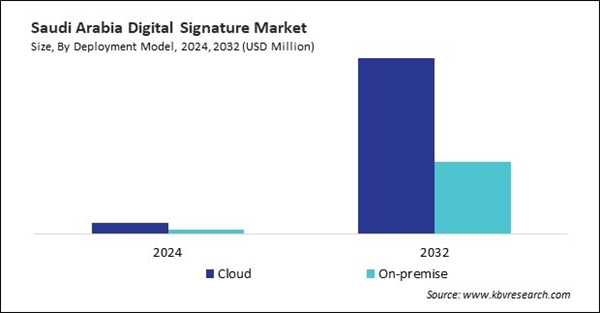The Brazil market dominated the LAMEA Digital Signature Market by country in 2024, and is expected to continue to be a dominant market till 2032; thereby, achieving a market value of $2.21 billion by 2032. The Argentina market is showcasing a CAGR of 43% during 2025-2032. Additionally, the UAE market would register a CAGR of 40.1% during 2025-2032.
The adoption of digital signatures has been influenced by multiple factors, including regulatory mandates, technological readiness, and the pursuit of operational efficiency. Regulatory frameworks such as the Electronic Signatures in Global and National Commerce Act (ESIGN Act) in the US, the eIDAS Regulation in the European Union, and various local laws in Asia-Pacific and Latin America have established legal recognition for digital signatures, thereby bolstering their adoption.
These regulations typically differentiate between electronic and digital signatures, with digital signatures often offering a higher level of security and compliance due to their reliance on cryptographic technology. Adoption has also been driven by the digital transformation initiatives undertaken by organizations. As enterprises seek to digitize workflows, reduce reliance on paper, and accelerate processes, digital signatures offer a compelling value proposition.
The LAMEA region’s digital signature market has evolved steadily over the past decade, reflecting a broad push toward digital transformation and secure, paperless transactions. Governments across Latin America, the Middle East, and Africa have recognized the importance of electronic signatures in enhancing efficiency, transparency, and accessibility in both public and private sectors. Early milestones in Latin America included Brazil’s Provisional Measure No. 2,200-2/2001, which created a legal framework for digital signatures, and Mexico’s Federal Advanced Electronic Signature Law (FEA). These frameworks granted digital signatures legal equivalence to handwritten signatures, enabling their use in government transactions, tax filings, banking, and commerce.
In the Middle East, the United Arab Emirates pioneered e-signature adoption through laws and initiatives like the UAE Electronic Transactions and Commerce Law and the Smart Dubai program, which integrated digital signatures into government and business services. Saudi Arabia, Egypt, and South Africa followed suit, passing legislation to facilitate digital signatures and launching national digital identity platforms. African nations, while more recent adopters, have begun to invest in digital signature infrastructure, with countries like South Africa enacting the Electronic Communications and Transactions Act and others, such as Kenya and Nigeria, rolling out e-government services that incorporate digital signatures. The evolution of the market has been shaped by growing digital literacy, mobile penetration, and the need for efficient, contactless transactions - factors that accelerated during the COVID-19 pandemic.
OEMs such as DocuSign, Adobe, and regional firms like Certisign (Brazil), eMudhra (active in Africa), and ZealSign (Middle East) have expanded their presence, providing secure digital signature solutions that comply with local regulations. The LAMEA digital signature market is highly competitive and fragmented, reflecting the region’s diversity in legal standards, digital infrastructure, and user needs. Global providers such as DocuSign and Adobe are present and expanding, especially in large and mid-sized markets, but they face strong competition from regional and national players like Certisign, Mifiel, and ZealSign, which offer deep local expertise and tailor solutions to specific regulatory environments.
Government-certified trust service providers and national certification authorities play an important role, especially in Brazil, the UAE, and South Africa, where public trust and legal compliance are crucial. Many countries also see competition from telecom-led platforms and banks that provide their own e-signature services to clients and partners. As digital transformation continues across the region, competition will drive further innovation and improvement in the reliability, usability, and security of digital signature solutions available in LAMEA.
List of Key Companies Profiled
- DocuSign, Inc.
- Adobe, Inc.
- PandaDoc Inc.
- Dropbox, Inc.
- Zoho Corporation Pvt. Ltd.
- Thales Group S.A.
- GMO GlobalSign Pte. Ltd (GMO Internet Group, Inc.)
- IdenTrust, Inc. (HID Global Corporation)
- Sertifier INC.
- GetAccept, Inc.
Market Report Segmentation
By Level
- Advanced Electronic Signatures (AES)
- Qualified Electronic Signatures (QES)
By Component
- Solutions
- Services
By Deployment Model
- Cloud
- On-premise
By End Use
- Businesses
- Organizations
- Individuals
By Industry Vertical
- BFSI
- Healthcare & Life Sciences
- IT & Telecom
- Government
- Retail
- Other End User
By Country
- Brazil
- Argentina
- UAE
- Saudi Arabia
- South Africa
- Nigeria
- Rest of LAMEA
Table of Contents
Companies Mentioned
- DocuSign, Inc.
- Adobe, Inc.
- PandaDoc Inc.
- Dropbox, Inc.
- Zoho Corporation Pvt. Ltd.
- Thales Group S.A.
- GMO GlobalSign Pte. Ltd (GMO Internet Group, Inc. )
- IdenTrust, Inc. (HID Global Corporation)
- Sertifier INC.
- GetAccept, Inc.









